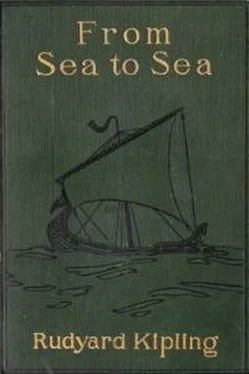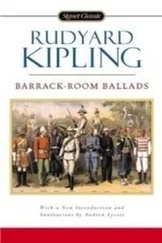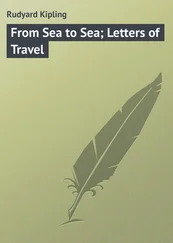Джозеф Киплинг - From Sea to Sea
Здесь есть возможность читать онлайн «Джозеф Киплинг - From Sea to Sea» весь текст электронной книги совершенно бесплатно (целиком полную версию без сокращений). В некоторых случаях можно слушать аудио, скачать через торрент в формате fb2 и присутствует краткое содержание. Год выпуска: 2014, Издательство: epubBooks Classics, Жанр: Биографии и Мемуары, Публицистика, на английском языке. Описание произведения, (предисловие) а так же отзывы посетителей доступны на портале библиотеки ЛибКат.
- Название:From Sea to Sea
- Автор:
- Издательство:epubBooks Classics
- Жанр:
- Год:2014
- ISBN:нет данных
- Рейтинг книги:3 / 5. Голосов: 1
-
Избранное:Добавить в избранное
- Отзывы:
-
Ваша оценка:
- 60
- 1
- 2
- 3
- 4
- 5
From Sea to Sea: краткое содержание, описание и аннотация
Предлагаем к чтению аннотацию, описание, краткое содержание или предисловие (зависит от того, что написал сам автор книги «From Sea to Sea»). Если вы не нашли необходимую информацию о книге — напишите в комментариях, мы постараемся отыскать её.
From Sea to Sea — читать онлайн бесплатно полную книгу (весь текст) целиком
Ниже представлен текст книги, разбитый по страницам. Система сохранения места последней прочитанной страницы, позволяет с удобством читать онлайн бесплатно книгу «From Sea to Sea», без необходимости каждый раз заново искать на чём Вы остановились. Поставьте закладку, и сможете в любой момент перейти на страницу, на которой закончили чтение.
Интервал:
Закладка:
By this time—for Amber and the Cotton–Press had filled the hours—night was falling, and the priests unhooked the swinging jets and began to light up the impassive face of Mahadeo with gas. They used Swedish matches!
Full night brought the hotel and its curiously composed human menagerie.
There is, if a work–a–day world will believe, a society entirely outside, and unconnected with, that of the Station—a planet within a planet, where nobody knows anything about the Collector's wife, the Colonel's dinner–party, or what was really the matter with the Engineer. It is a curious, an insatiably curious, thing, and its literature is Newman's Bradshaw . Wandering "old arms–sellers" and others live upon it, and so do the garnetmen and the makers of ancient Rajput shields. The world of the innocents abroad is a touching and unsophisticated place, and its very atmosphere urges the Anglo–Indian unconsciously to an extravagant mendacity. Can you wonder, then, that a guide of long–standing should in time grow to be an accomplished liar?
Into this world sometimes breaks the Anglo–Indian returned from leave, or a fugitive to the sea, and his presence is like that of a well–known land–mark in the desert. The old arms–seller knows and avoids him, and he is detested by the jobber of gharis who calls every one "my lord" in English, and panders to the "glaring race anomaly" by saying that every carriage not under his control is "rotten, my lord, having been used by natives." One of the privileges of playing at tourist is the brevet–rank of "Lord."
There are many, and some very curious, methods of seeing India. One of these is buying English translations of the more Zolaistic of Zola's novels and reading them from breakfast to dinner–time in the verandah. Yet another, even simpler, is American in its conception. Take a Newman's Bradshaw and a blue pencil, and race up and down the length of the Empire, ticking off the names of the stations "done." To do this thoroughly, keep strictly to the railway buildings and form your conclusions through the carriage–windows. These eyes have seen both ways of working in full blast; and, on the whole, the first is the most commendable.
Let us consider now with due reverence the modern side of Jeypore. It is difficult to write of a nickel–plated civilisation set down under the immemorial Aravalis in the first state of Rajputana. The red–grey hills seem to laugh at it, and the ever–shifting sand–dunes under the hills take no account of it, for they advance upon the bases of the monogrammed, coronet–crowned lamp–posts, and fill up the points of the natty tramways near the Waterworks, which are the outposts of the civilisation of Jeypore.
Escape from the city by the Railway Station till you meet the cactus and the mud–bank and the Maharaja's Cotton–Press. Pass between a tramway and a trough for wayfaring camels till your foot sinks ankle–deep in soft sand, and you come upon what seems to be the fringe of illimitable desert—mound upon mound of tussocks overgrown with plumed grass where the parrots sit and swing. Here, if you have kept to the road, you shall find a dam faced with stone, a great tank, and pumping machinery fine as the heart of a municipal engineer can desire—pure water, sound pipes, and well–kept engines. If you belong to what is sarcastically styled an "able and intelligent municipality" under the British Rule, go down to the level of the tank, scoop up the water in your hands and drink, thinking meanwhile of the defects of the town whence you came. The experience will be a profitable one. There are statistics in connection with the Waterworks figures relating to "three–throw–plungers," delivery and supply, which should be known to the professional reader. They would not interest the unprofessional who would learn his lesson among the thronged standpipes of the city.
While the Englishman was preparing in his mind a scathing rebuke for an erring municipality that he knew of, a camel swung across the sands, its driver's jaw and brow bound mummy–fashion to guard against the dust. The man was evidently a stranger to the place, for he pulled up and asked the Englishman where the drinking–troughs were. He was a gentleman and bore very patiently with the Englishman's absurd ignorance of his dialect. He had come from some village, with an unpronounceable name, thirty kos away, to see his brother's son, who was sick in the big Hospital. While the camel was drinking the man talked, lying back along his mount. He knew nothing of Jeypore, except the names of certain Englishmen in it, the men who, he said, had made the Waterworks and built the Hospital for his brother's son's comfort.
And this is the curious feature of Jeypore; though happily the city is not unique in its peculiarity. When the late Maharaja ascended the throne, more than fifty years ago, it was his royal will and pleasure that Jeypore should advance. Whether he was prompted by love for his subjects, desire for praise, or the magnificent vanity with which Jey Singh must have been so largely dowered, are questions that concern nobody. In the latter years of his reign, he was supplied with Englishmen who made the State their fatherland, and identified themselves with its progress as only Englishmen can. Behind them stood the Maharaja ready to spend money with a lavishness that no Supreme Government would dream of; and it would not be too much to say that they together made the State what it is. When Ram Singh died, Madho Singh, his successor, a conservative Hindu, forbore to interfere in any way with the work that was going forward. It is said in the city that he does not overburden himself with the cares of State, the driving power being mainly in the hands of a Bengali, who has everything but the name of Minister. Nor do the Englishmen, it is said in the city, mix themselves with the business of government; their business being wholly executive.
They can, according to the voice of the city, do what they please, and the voice of the city—not in the main roads, but in the little side–alleys where the stall–less bull blocks the path—attests how well their pleasure has suited the pleasure of the people. In truth, to men of action few things could be more delightful than having a State of fifteen thousand square miles placed at their disposal, as it were, to leave their mark on. Unfortunately for the vagrant traveller, those who work hard for practical ends prefer not to talk about their doings, and he must, therefore, pick up what information he can at second–hand or in the city. The men at the standpipes explain that the Maharaja Sahib's father gave the order for the Waterworks and that Yakub (Jacob) Sahib made them—not only in the city, but out away in the district. "Did the people grow more crops thereby?" "Of course they did. Were canals made only to wash in?" "How much more crops?" "Who knows? The Sahib had better go and ask some official." Increased irrigation means increase of revenue for the State somewhere, but the man who brought about the increase does not say so.
After a few days of amateur Globe–trotting, a shamelessness great as that of the other loafer—the red–nosed man who hangs about one garden and is always on the eve of starting for Calcutta—possesses the masquerader; so that he feels equal to asking a Resident for a parcel–gilt howdah, or dropping into dinner with a Lieutenant–Governor. No man has a right to keep anything back from a Globe–trotter, who is a mild, temperate, gentlemanly, and unobtrusive seeker after truth. Therefore he who, without a word of enlightenment, sends the visitor into a city which he himself has beautified and adorned and made clean and wholesome, deserves unsparing exposure. And the city may be trusted to betray him. The malli in the Ram Newas Gardens—Gardens which are finer than any in India and fit to rank with the best in Paris—says that the Maharaja gave the order and Yakub Sahib made the Gardens. He also says that the Hospital just outside the Gardens was built by Yakub Sahib, and if the Sahib will go to the centre of the Gardens, he will find another big building, a Museum by the same hand.
Читать дальшеИнтервал:
Закладка:
Похожие книги на «From Sea to Sea»
Представляем Вашему вниманию похожие книги на «From Sea to Sea» списком для выбора. Мы отобрали схожую по названию и смыслу литературу в надежде предоставить читателям больше вариантов отыскать новые, интересные, ещё непрочитанные произведения.
Обсуждение, отзывы о книге «From Sea to Sea» и просто собственные мнения читателей. Оставьте ваши комментарии, напишите, что Вы думаете о произведении, его смысле или главных героях. Укажите что конкретно понравилось, а что нет, и почему Вы так считаете.












